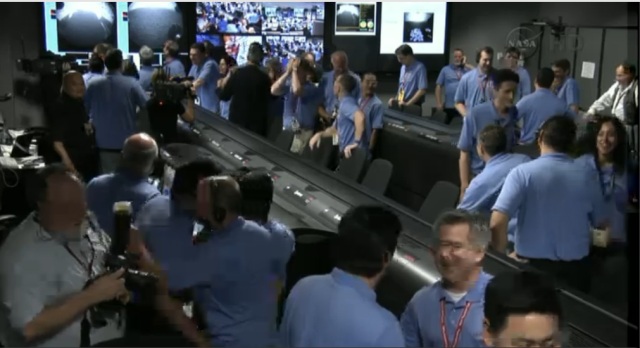
Science fiction and technology writer
Popular blog posts
Recent forum posts
Discussion Forum
Discussion forumMy article on computer/phone/tablet marketshare is up on Ars Technica!
Post #: 128
Post type: Blog post
Date: 2012-08-14 20:24:20.000
Author: Jeremy Reimer
Tags: Computers

It’s hard to believe the last time I did one of these articles was 2005, and since then not one but TWO new product categories have been introduced to the world.
I’m pretty happy with the way this article turned out, which is pretty much exactly how I wanted it: a nostalgia trip for the personal computer industry and a comparison with the new smartphone and tablet world.
Oh, here’s the link:
http://arstechnica.com/business/2012/08/from-altair-to-ipad-35-years-of-personal-computer-market-share/
Views: 16180
It was thirty years ago today...
Post #: 126
Post type: Blog post
Date: 2022-01-25 22:43:39.000
Author: Jeremy Reimer
Tags: Family, Audio
August 13, 1982. A young, precocious ten year-old boy finally convinces his family to let him tape record the evening meal.
Thirty years later, a much older boy finds the tape in a closet and decides to try and preserve long-lost family memories. (Digitizing and cleaning up the audio was an interesting process, and I’ll blog about that later).
I was a bit of a twit back in those days, a bit of a know-it-all, and I liked to interrupt people a lot. I think a lot of it was being ten, and the rest of it was due to my excitement at finally being able to record dinner. It was kind of a like a very early podcast!
Hearing my mom and dad’s voices again is very bittersweet, but I also laughed a lot. Check out the coffee grinder at 26 minutes in!
You can read more about the "Flying Bandit" that my dad referred to (and once met) here: http://thiswaswinnipeg.blogspot.ca/2008/07/flying-bandit.html
Link to Reimer Family Dinner 1982
Views: 16090
NASA Curiosity rover lands on Mars!
Post #: 124
Post type: Blog post
Date: 2012-08-05 22:52:16.000
Author: Jeremy Reimer
Tags: Space


Views: 7538
Knotty Geeks Episode 17 - Where are the flying cars?
Post #: 123
Post type: Podcast
Date: 2012-07-21 08:44:49.000
Author: Jeremy Reimer
Tags: Knotty Geeks
In a special Knotty Geeks recorded deep inside the new Surrey campus of Simon Fraser University, we look at our accelerating world and ask if technology is really progressing in all areas or are we sliding backwards in some? From flying cars to asteroid mining, what does the future really hold?
Links from the show:
Ray Kurzweil on acceleration: http://www.amazon.com/The-Singularity-Is-Near-Transcend/dp/0670033847
Ronald Reagan declared GPS should be free to everyone: http://www.america.gov/st/washfile-english/2006/February/20060203125928lcnirellep0.5061609.html
Flame virus: http://arstechnica.com/security/2012/05/spy-malware-infecting-iranian-networks-is-engineering-marvel-to-behold/
Where are the flying cars? http://www.thebaffler.com/past/of_flying_cars
You are not so smart: http://www.amazon.com/You-Are-Not-So-Smart/dp/1592406599
This will make you smarter: http://www.amazon.com/This-Will-Make-You-Smarter/dp/0062109391
./uploads/Knotty_Geeks_Episode_17.mp3" />
./uploads/Knotty_Geeks_Episode_17.mp3" width="290" height="24" />
Views: 7320
Going to Comic-Con!
Post #: 122
Post type: Blog post
Date: 2012-07-11 21:28:20.000
Author: Jeremy Reimer
Tags: Conventions, Comics

Tomorrow I'm getting on a plane for San Diego, headed for Comic-Con!
I've never been to a Comic-Con before, so I have no idea what to expect. I've downloaded the schedule on a great iPhone app that I used for PAX called Guidebook.
I'm excited!!
Views: 7919
Barcraft Night in Vancouver
Post #: 121
Post type: Blog post
Date: 2012-06-13 15:34:03.000
Author: Jeremy Reimer
Tags: Gaming, Starcraft

The Barcraft was a huge success! We nerds took over both sides of the bar and every single TV screen was showing Starcraft II.
Plenty of drinks and fun were had while we cheered Park "DongRaeGu" Soo Ho as he won his first MLG Championship title on a live stage.
It was completely awesome and I will definitely be back for the next one!
Views: 7827
Sometimes dreams come true faster than you think...
Post #: 120
Post type: Blog post
Date: 2012-06-08 13:22:37.000
Author: Jeremy Reimer
Tags: Starcraft, Gaming
I was re-reading my article on the history of professional Starcraft and I came across this comment:
[quote]
Kraicat - about a year ago
I don’t like traditional sports. I’ve never gotten into or really enjoyed any typical game of Football, Basketball, Baseball, etc... When I go into a bar, I would rather watch Simpsons instead of some random college teams playing each other in some sport.
I dream of the day when I can go to my local bar, look up at the big screen and see a StarCraft competition going on. I will scream and holler at the screen, chat with other guys about their strategy and finally be able to enjoy competitive games in public.
But I’ll bet that day is still pretty far off.
[/quote]
Well, this Sunday, I’m heading down to the MLG, live from Anaheim.
About a year after the article was published and the comment made, it has actually happened. I am going to go to a sports bar in my home city and watch live Starcraft on the big screen.
I can’t wait.
Views: 7440
On turning 40
Post #: 117
Post type: Blog post
Date: 2012-03-22 16:11:16.000
Author: Jeremy Reimer
Tags: Jeremy Birthday

I’ve had a week to think about this now, so here we go.
My 40th birthday went exactly as I had wanted it. I had a nice dinner celebration with family and friends, I gave a very short speech, and everyone had a good time. There was cake. The next day I played Shadowrun with friends, and the day after Jen and I went to Victoria and stayed at the Empress. We did In-Room Dining and Afternoon Tea.
It was absolutely awesome.
Now I have some time to reflect on what this next decade means for me. My 20s were characterized primarily by the search for a life partner, which I achieved when I married Jennifer in 2001, when I was 29. My 30s were all about searching for a career, for some place I could go work where I felt my talents were well utilized and I could make a difference. By the time I was 39, I felt I had achieved this. I had not only found a great company but created my own dream job within that company. This wasn’t easy to do by any means, but it happened, and it has given me great satisfaction.
So what’s next?
There are clearly things left to on a personal level, both at work and away from work. I’m working hard on the sequel to my first novel, and I’m still writing articles for Ars Technica, both things I did during my 30s. I have all sorts of new goals and projects at work. These things aren’t going away.
But if I had to define a long-term objective for this decade, it would be this: to create something new and deliver it to the public. Not a book, although I’m doing that as well. No, this is something much greater in scope, and something that I hope reaches a larger audience. I’m not quite ready yet to reveal what it is, but it is going to be awesome.
Views: 7685
Kitten Captcha now online!
Post #: 114
Post type: Blog post
Date: 2012-03-05 14:08:25.000
Author: Jeremy Reimer
Tags: Software, Monarch
I was going to do this when I first released Monarch, but it seemed hard so I didn’t actually get around to doing it.
Until now.
To prevent spammers that can read even the most twisted words and phrases, I’ve implemented my own version of Kitten Captcha, something I wrote about on Ars way back in 2006 here:
http://arstechnica.com/old/content/2006/04/6554.ars
Well, I’ve finally done it. The system displays a bunch of random pictures and a new user has to select all the pictures that are in fact cats. The file names are all randomized so that a spambot can’t just guess what they are, and you have to pick only three out of the ten images so you can’t just select everything.
I deleted all the spam accounts that OSY 3.0 had accumulated (about 30 of them!) and so we’ll see how this new system works. I hope it both discourages bots and encourages new users due to its being cute and cuddly.
Here’s a screenshot of the page in action:
Views: 8396
When robots write blogs...
Post #: 110
Post type: Blog post
Date: 2012-02-23 13:32:20.000
Author: Jeremy Reimer
Tags: Internet

Many years ago, my website (the one you’re reading now!) did not live on jeremyreimer.com, but a domain I registered called pegasus3d.com. (The Wayback machine has records dating back to May 1, 2001, but I think it was around earlier:
http://web.archive.org/web/20010501232114/http://www.pegasus3d.com
Why Pegasus3D? Well, I had recently taken a 3D animation course, and I had silly dreams about starting a one-person company to do animation. Pegasus was the name I used when I was a small child building Lego Space Ships to refer to my giant, world-sized flagship. (I had not seen the 1970’s Battlestar Galactica episode that introduced said ship, or maybe I had, it doesn’t really matter)
None of this matters. This isn’t the point of this post.
Years later I let the pegasus3d.com domain lapse, as I wanted to brand all my web stuff under my own name. I figured nobody would grab it, because why would you want such a silly domain name?
Well, I was wrong. Last month, somebody got it. Or, to be more accurate, some thing got it. Check it out: http://www.pegasus3d.com
It looks like a standard WordPress blog, right? Only look at the articles. They SEEM like standard, boring blog posts about--wait, what are they about again?
If you read them closely, they aren’t about anything! It’s just random text made to look like a blog post. Some computer is churning out articles filled with spam links. I suppose I should be glad that said robot isn’t posting on my blog with their random spam links, as many robots do. But it’s still somewhat disturbing. I may not blog a lot, and I may not use that domain any more, but it used to be full of content created by a human. Now it’s full of content created by a robot, hoping to be read by humans.
One wonders if they couldn’t cut us out of the loop altogether, and have robots read the robot blog posts. Hmm.
This sort of thing isn’t an isolated incident, either. Big name sites like Forbes.com are using far more sophisticated robots to write articles for them that they used to have to pay humans for: http://www.mediabistro.com/galleycat/forbes-among-30-clients-using-computer-generated-stories-instead-of-writers_b47243
My friend Terry and I have talked before on our Knotty Geeks podcast about the book The Lights In The Tunnel, about how the future of our economy is a bunch of people with all the money and nobody having any jobs because they have first been outsourced, then replaced by computers. This is happening and there is little that any of us can do to stop it.
I’m not a Luddite: I don’t advocate smashing the computers in protest. The solution involves creating new types of jobs, ones that (for the moment at least) robots can’t handle. Beyond that, I have no idea what to do about this.
EDIT: Followup in 2013:
The robo-page is gone, but the site is now just a "parked" domain with the standard ugly Godaddy default crap inside it. I'm not sure if this is better or worse.
Views: 7643
So who am I?
I'm a writer and programmer. I write science fiction stories and novels.
I am the writer for the upcoming documentary series Arcade Dreams.
I also write technology articles for Ars Technica.
I'm the creator of newLISP on Rockets, a web development framework and blog application.
- Email: jeremy.reimer@gmail.com
Topics
3D Modeling
About Me
Amiga
Articles
Audio
Blockchain
Blog
Blogs
Book Reviews
Book review
Comics
Computer history
Computers
Computers Microhistory
Computing
Conventions
Crypto
Daily update
Entrepreneur
Family
Forum post
Gaming
Gaming Starcraft
Gaming metaverse
Internet
Jeremy Birthday
Kickstarter
Knotty Geeks
Knotty Geeks (video)
Market Share
Masters Trilogy
Monarch
Movies
My Non-Fiction
My Science Fiction
NewLISP Blog
Novels
OSY
Operating Systems
Pets
Poll
Reviews
Science Fiction
Servers
Software
Software Operating Systems
Space
Star Gamer
Star Trek
Starcraft
Television
Testing
Toys Childhood
Wedding Marriage
Work
Work Life
World
Writing
 RSS Feed for this blog
RSS Feed for this blog